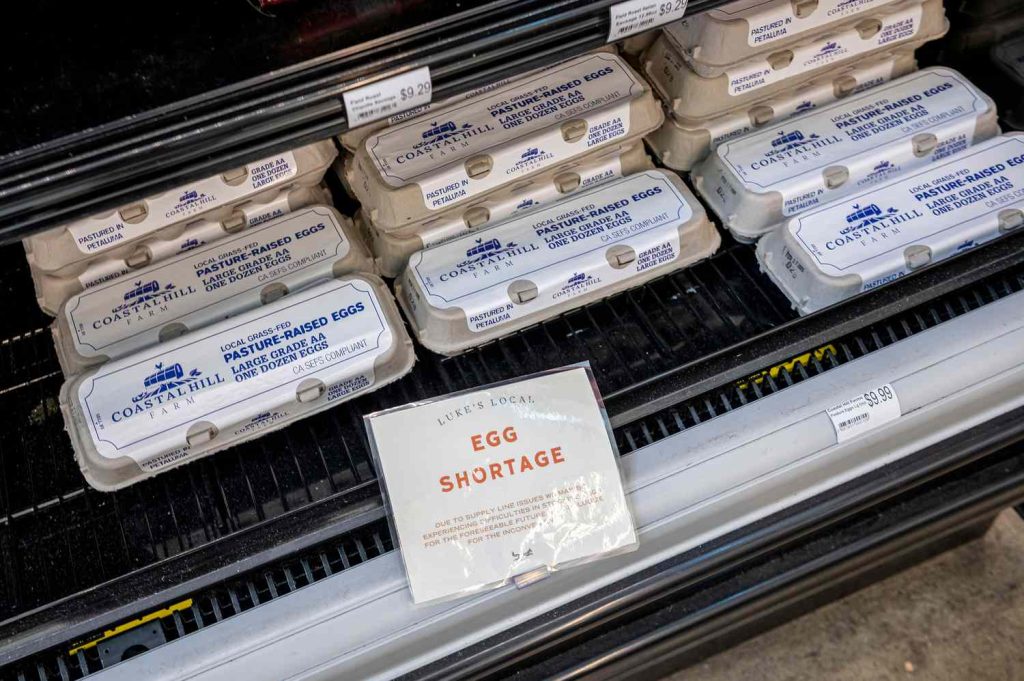Bird flu outbreaks have led to egg shortages and price hikes across the United States. If you normally start your day with an omelet or egg sandwich, there are plenty of protein-rich options for an equally nutritious breakfast.
A whole egg contains about 6 to 7 grams of protein. Most adults need 0.8 g of protein per kilogram of body weight daily. For someone who weighs 120 lbs (about 54 kg), that’s about 43 g of protein per day.
With average egg prices nearing $5 per dozen and some grocery stores limiting purchases, you may need to cut back on eggs. However, this doesn’t mean you should reduce your total protein intake. Dietary protein plays a key role in cell repair, muscle-building, and immune function.
“If you still can afford to include some eggs but just want to stretch them further, try adding cottage cheese and plenty of veggies like steamed broccoli or sauteed zucchini to quiches, omelets, or scrambled eggs to provide bigger portions and extra nutrition,” Debbie Petitpain, MBA, RD, a South Carolina-based registered dietitian and spokesperson for the Academy of Nutrition and Dietetics, told Verywell in an email.
Greek yogurt, tofu, and peanut butter all contain good amounts of protein.
“You don’t need eggs in your diet as a protein source if you’re eating a broad base of other things,” said Sherry Gray, MPH, RD, a registered dietitian and a nutrition educator at the University of Connecticut.
You may also consider these four high-protein alternatives to eggs.
1. Canned Tuna
Some high-protein foods, such as canned tuna, have more protein than eggs. A 100 g serving of canned tuna has 19 g of protein, while 100 g of eggs—about two whole eggs—has just 12 g of protein. Swap tuna for eggs the next time you want to make an egg salad sandwich.
In addition to protein, tuna also provides heart-healthy omega-3 fatty acids that help lower blood pressure and reduce inflammation.
2. Tofu
Tofu is a versatile plant-based food that can replace eggs in scrambles, egg sandwiches, and many other breakfast dishes. Typically, a quarter block of tofu (about 100 g or 3.5 oz) contains between 8 g and 17 g of protein.
“A savory tofu scramble with vegetables, seasoning, and cheese can serve as a nice alternative to a traditional egg omelet,” Brianna Poole, MS, RD, LD, a sports dietitian at Memorial Hermann | Rockets Sports Medicine Institute, told Verywell in an email.
Tofu contains other nutrients like calcium and magnesium and it’s a safe protein option for most people, except those with soy allergies. While animal studies have raised some concerns about possible health risks related to soy, the evidence does not prove that soy-based foods increase cancer risk in humans. In fact, soy foods may lower the risk of certain cancers, support heart health, and help reduce cholesterol.
“Depending on dietary needs, tofu can serve as an excellent plant-based alternative to eggs while still offering high-quality protein,” Poole added.
3. Black Beans
If you want to make a breakfast burrito with fewer eggs, you can use a mixture of black beans and eggs. A half-cup of black beans has about 7 g of protein. Combine that with a large egg and you’ll have a protein-rich start to the day.
Black beans and other legumes like chickpeas and pinto beans have plenty of fiber to keep you feeling full.
4. Dairy
While you may have to get creative with your breakfast menu, try swapping egg dishes for dairy products like Greek yogurt, milk, or cottage cheese.
High-protein dairy sources offer the essential amino acids along with key nutrients like probiotics, vitamin D, calcium, and iodine, according to Renee Korczak, PhD, RDN, CSSD, LD, an assistant professor of food science and nutrition at the University of Minnesota-Twin Cities.
“[U]sing dairy products in smoothies or pairing Greek yogurt with whole grain toast and fruit, provides balance to a breakfast meal,” Korczak told Verywell in an email.
A half-cup of low-fat cottage cheese has 12 g of protein, and a single-serving container of non-fat Greek yogurt has about 16 g of protein.
What This Means For You
Egg shortages and rising prices may make it harder to rely on eggs for protein, but plenty of alternatives can help meet your daily needs. Foods like canned tuna, tofu, black beans, and dairy products offer high-quality protein along with other important nutrients.
-
U.S. Department of Agriculture: FoodData Central. Eggs, grade A, large, egg whole.
-
American Heart Association. Protein: what’s enough?.
-
Harvard T. H. Chan School of Public Health. Protein.
-
U.S. Department of Agriculture: FoodData Central. Fish, tuna, light, canned in water, drained solids.
-
Harvard Health Publishing. The story on fish and heart health.
-
U.S. Department of Agriculture: FoodData Central. Tofu, raw, regular, prepared with calcium sulfate.
-
U.S. Department of Agriculture: FoodData Central. Tofu, raw, firm, prepared with calcium sulfate.
-
Fan Y, Wang M, Li Z, et al. Intake of soy, soy isoflavones and soy protein and risk of cancer incidence and mortality. Front Nutr. 2022;9:847421. doi:10.3389/fnut.2022.847421
-
American Cancer Society. Soy and cancer risk: our expert’s advice.
-
U.S. Department of Agriculture: FoodData Central. Seasoned black beans, seasoned.
-
Harvard Health Publishing. Foods high in fiber: boost your health with fiber-rich foods.
-
U.S. Department of Agriculture: FoodData Central. Cheese, cottage, lowfat, 2% milkfat.
-
U.S. Department of Agriculture: FoodData Central. Yogurt, Greek, plain, nonfat.
:max_bytes(150000):strip_icc()/StephanieBrownnewheadshot-e5ca9ba2a404491384e9300a7871f190.jpg)
By Stephanie Brown
Brown is a nutrition writer who received her Didactic Program in Dietetics certification from the University of Tennessee at Knoxville. Previously, she worked as a nutrition educator and culinary instructor in New York City.
Thanks for your feedback!
What is your feedback?








